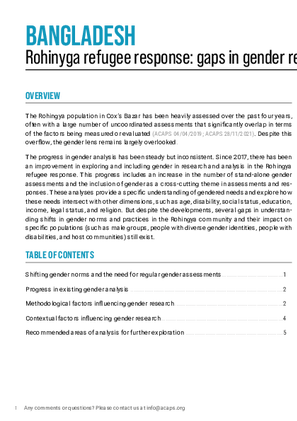-
Countries
-
Data and Analysis
-
Special Focus
-
Crisis Responses
Bangladesh — NPM ACAPS Analysis Hub Report — Rohingya Refugee Response: Gaps in Gender Research (January 2018 - December 2022)

Contact
NPM Bangladesh, NPMBangladesh@iom,int
Language
English
Location
Bangladesh
Period Covered
Jan 01 2018
Dec 31 2022
Activity
- Other
The Rohingya population in Cox’s Bazar has been heavily assessed over the past four years, often with a large number of uncoordinated assessments that significantly overlap in terms of the factors being measured or evaluated (ACAPS 04/04/2019; ACAPS 28/11/2021). Despite this overflow, the gender lens remains largely overlooked.
The progress in gender analysis has been steady but inconsistent. Since 2017, there has been an improvement in exploring and including gender in research and analysis in the Rohingya refugee response. This progress includes an increase in the number of stand-alone gender assessments and the inclusion of gender as a cross-cutting theme in assessments and responses. These analyses provide a specific understanding of gendered needs and explore how these needs intersect with other dimensions, such as age, disability, social status, education, income, legal status, and religion. But despite the developments, several gaps in understanding shifts in gender norms and practices in the Rohingya community and their impact on specific populations (such as male groups, people with diverse gender identities, people with disabilities, and host communities) still exist.
